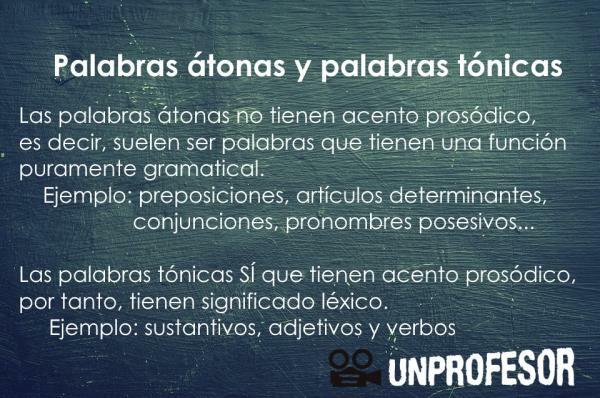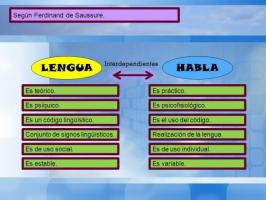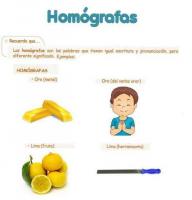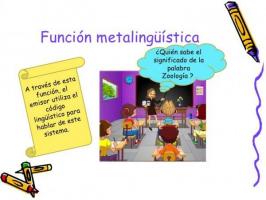Unstressed words and stressed words

In Spanish there are two different kinds of words according to the prosodic accent, since, although it is true Since most words in Spanish have an accent, we can also find some that do not have. Thus, following this criterion of accentuation, we have two different types of words: on the one hand, the unstressed words (that do not have a prosodic accent) and, on the other hand, tonic words (those that do have an accent prosodic).
In this lesson from a TEACHER we are going to study these two groups of words, explaining what are the main differences between them and seeing various examples of unstressed and stressed words clarify the explanation.
First, let's talk about unstressed words. The Dictionary of the Royal Spanish Academy (DRAE) defines the adjective "unstressed" like that one "that does not have a prosodic accent". The prosodic accent as such is the one through which we pronounce the stressed syllable of a word with greater emphasis, so that a word that lacks a prosodic accent is an unstressed word.
Generally, unstressed words are usually all words whose main function within speech is purely grammatical. For example, prepositions such as "a", "de", "por", "para", "with", "without" are unstressed words. fundamentally, to introduce a term and form a prepositional phrase within the sentence, as for example in the next sentence: This gift is for you.
Following this same line of grammatical words, the certain items "el", "la", "los" and "las" respectively, are also unstressed words, since they lack their own prosodic accent and, when we use them Within the speech, they must rely on the tonic word that they accompany to be able to pronounce correctly, as for example in the sentence I loved the book you left me the other day.
Along with the prepositions and the determined articles, we also find, within the group of unstressed Spanish words, with the prefixed possessive pronouns, as "my", "your", "his", "our", "your" and "his" respectively, as we can see in the sentence Our car is the newest in the neighborhood.
Also conjunctions, whose main function is to link different sentences, they are considered unstressed words. For example, conjunctions like "that", "and" or "although" in sentences like Even if it rains, we'll go on vacation next week.
Compared to the unstressed words that we have seen previously, Spanish also has stressed words, which are all those words that have their own prosodic accent; that is, they present a stressed syllable that stands out above the other syllables that make up the word when pronounced. Tonic words, by definition, are independent words at the prosodic level, since they do not need to rely on any other word to be able to pronounce correctly within the speech.
Unlike unstressed words, which have a purely grammatical function in most cases, stressed words are usually all those words that have their own lexical meaning; that is, types of words like nouns, adjectives or verbs they are, for the most part, tonic words.
For example, all of the following words are tonic: "day", "Thursday", "wallet", "state", "yellow", "young", "dance", "sleep", "difficult", "easy", "folder", "table", "room", "house", "meeting", "communication", "vacation", "nice", "tree", "pen", "t-shirt", "eat", "do ", "look", "clock", etc.
However, we also find some pronouns that do present a prosodic accent and, therefore, are considered as stressed words, as is the case of personal pronouns with subject function, such as "I", "you", "he", "she", "you", "we", "you" and "you", in sentences such as: He is my best friend or We don't want to eat at that expensive restaurant.
Similarly, the pronouns that function as the term of a preposition within a prepositional phrase, tonic words, such as "me", "you" or "yes" are also considered in sentences like the following: For me, the best way to learn is by working.



